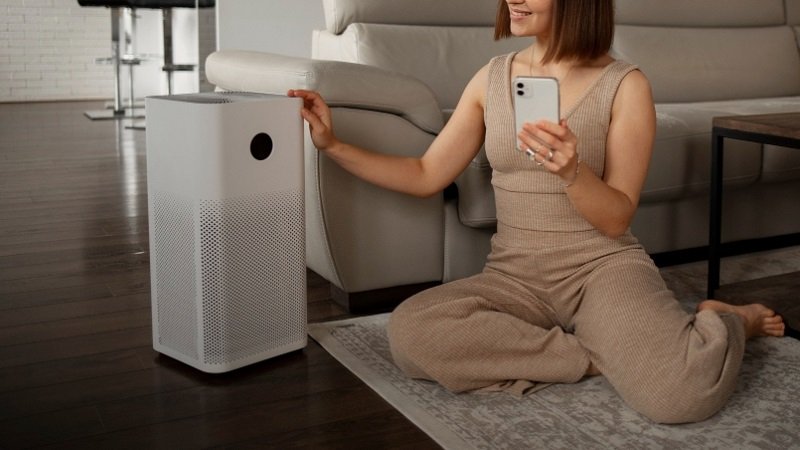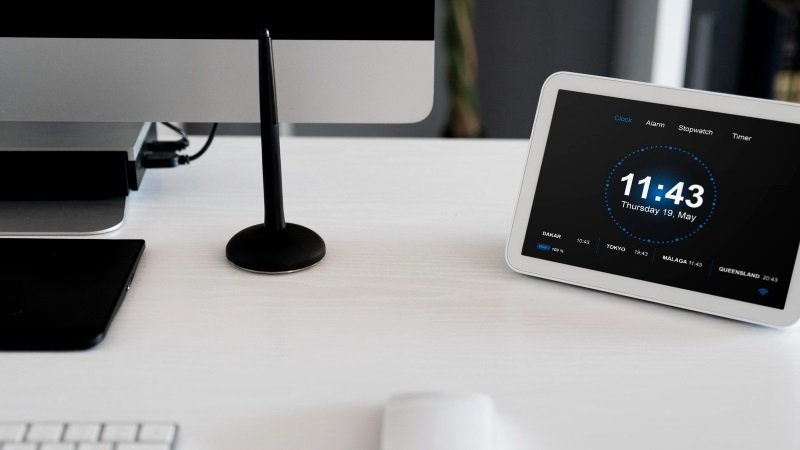Smart Home Automation for Indoor Air Quality
Poor IAQ can cause a variety of health problems, including respiratory problems, allergies, and headaches. Indoor air quality (IAQ) is important for our health and well-being. Smart home automation can help you improve your IAQ by automatically controlling your home’s ventilation, humidity, and temperature.

There are a number of ways that smart home automation can improve IAQ. For example,
Smart Thermostats for Efficient Ventilation
Smart thermostats play a vital role in regulating indoor air quality by managing temperature and humidity levels. They automatically adjust ventilation, ensuring optimal air circulation and preventing the buildup of pollutants like mold and allergens.
Air Quality Monitoring and Alerts
Integrate smart air quality monitors into your home automation system to keep track of IAQ parameters. These devices detect pollutants such as volatile organic compounds (VOCs), particulate matter, and carbon dioxide. Receive real-time alerts and take immediate action when the air quality deviates from healthy levels.
Smart Air Purifiers for Cleaner Air
Smart air purifiers use advanced filtration technology to remove harmful particles and contaminants from the air. Control them remotely through your smartphone or set up automation routines for continuous air purification when needed.
Automated Ventilation and Filtration
Combine smart ventilation systems with air purifiers to optimize indoor air quality. Smart ventilation systems monitor outdoor air conditions and control air exchange rates accordingly. By automating this process, you ensure a constant supply of fresh, filtered air.
Humidity Control for Healthier Air
Excessive humidity can lead to mold growth and worsen respiratory conditions. Smart home automation allows you to monitor and regulate humidity levels. Set up smart dehumidifiers to maintain the ideal indoor humidity, promoting a healthy and comfortable living environment.
Voice-Activated IAQ Management
Smart home automation’s voice control feature adds convenience to managing IAQ. With voice assistants like Alexa or Google Assistant, you can adjust thermostats, control air purifiers, and monitor air quality, all hands-free.
Benefits of Smart Home Automation for IAQ
There are a number of benefits to using smart homes for IAQ. For example, smart home automation can help you:
- Save energy by automatically adjusting your home’s temperature and ventilation.
- Improve your comfort by creating a more comfortable and healthy indoor environment.
- Reduce your risk of health problems by removing pollutants from the air.
- Simplify your life by automating the tasks involved in maintaining good IAQ.
How to Choose Home Automation for IAQ?
When choosing home automation for IAQ, there are a few factors you’ll need to consider, including:
- The size of your home.
- The type of ventilation system you have.
- The level of automation you want.
- Your budget.
| Topic | Key Points |
|---|---|
| Smart Thermostats | – Regulate temperature and humidity for optimal air circulation. – Prevent pollutant buildup like mold and allergens. |
| Air Quality Monitoring and Alerts | – Smart monitors detect pollutants like VOCs and particulate matter. – Real-time alerts for timely action. |
| Smart Air Purifiers | – Advanced filtration technology removes harmful particles. – Remote control or automation for continuous air purification. |
| Automated Ventilation and Filtration | – Smart ventilation adjusts air exchange rates based on outdoor conditions. – Combined with air purifiers for cleaner air supply. |
| Humidity Control | – Smart dehumidifiers maintain ideal indoor humidity levels. – Prevent mold growth and improve respiratory health. |
| Voice-Activated IAQ Management | – Conveniently control IAQ devices through voice assistants. – Adjust thermostats, control air purifiers, and monitor air quality hands-free. |
How much does a high-quality IAQ cost?
The cost of a high-quality home automation system for IAQ (indoor air quality) can vary depending on the size of your home, the features you want, and the brand you choose. However, you can expect to pay anywhere from around $200 to $2,000 or more for a complete system.
If you are on a budget, there are still some good options available. You can find smart sensors that start at around $50 each.
| Level | Average Cost | Cost of Installation |
|---|---|---|
| Basic | $300 – $1,000 | $100 – $200 |
| Medium | $1,000 – $2,000 | $200 – $500 |
| High | $2,000 – $5,000 | $500 – $1,000 |
Total Cost
- Minimum: $300 (basic system)
- Maximum: $6,000 (high-end system)
Tips for Saving Money
- Start small. If you’re on a budget, you can start by buying a single air purifier for your bedroom or office.
- Choose affordable brands. There are a number of affordable brands of IAQ systems available.
- Do your research. Compare prices from different retailers before you make a purchase.
- Consider buying used. You can often find used IAQ systems in good condition for a fraction of the price of new systems.
- Do the installation yourself. If you’re comfortable working with electrical wiring or HVAC systems, you can save money by installing your own IAQ system.
Once you’ve considered these factors, you can start shopping for home automation products that will meet your needs. There are a variety of products available, so you’re sure to find something that fits your budget and your lifestyle.
Conclusion
The smart home can be a great way to improve your indoor air quality. By automating the tasks involved in maintaining good IAQ, you can save energy, improve your comfort, reduce your risk of health problems, and simplify your life.
Invest in home automation for improved Indoor Air Quality and experience the benefits of a cleaner, healthier, and more comfortable living space. Take the first step towards a smarter and healthier home today!
FAQs
- What are the benefits of Home Automation for IAQ?
Smart Home Automation offers convenience, real-time monitoring, and efficient management of IAQ for a healthier living space. - Are Home Automation systems easy to set up?
Yes, smart home automation systems are designed for easy installation and can be controlled through smartphone apps for user-friendly operation. - Can Smart Home help reduce allergies and respiratory issues?
Yes, by maintaining healthy IAQ, smart home automation can help reduce allergens and airborne pollutants, benefiting those with allergies and respiratory conditions.
“If you enjoyed this post, you might also like”
How to Set Up Smart Home on a Budget?
The Impact of AI on Home Automation
The Pros and Cons of Home Automation: Is It Right for You?
The benefits of smart home automation for energy efficiency!

